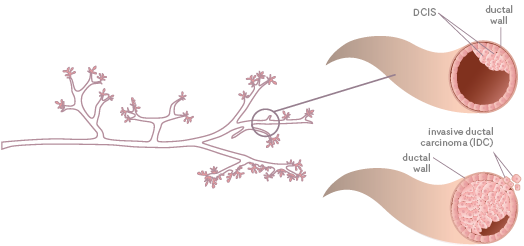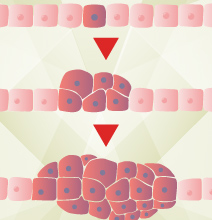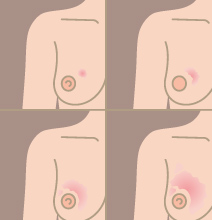In situ vs invasive
Carcinomas in situ are not real cancers. The tumor develops from the epithelial cells that line the ducts/lobules, but lack the ability to move (in situ means, literally, in place), so are never invasive (to be invasive is a defining characteristic for cancer).
For this reason, they are not seen as dangerous, except when the tumor grows so much that it starts compressing and damaging nearby breast structures.
Invasive carcinomas, on the other hand, do not stay confined. They break out of the duct or lobule where they first emerged and move to other breast tissues. If not detected and treated, they can move further and invade other organs.
When detected at early stages (before it can turn invasive), a carcinoma in situ has good chance of being successfully treated. That is why it is so important to participate in the recommended cancer screenings programs. The most common in situ carcinoma is the ductal carcinoma in situ (DCIS).
Ductal Carcinoma In Situ (DCIS)
DCIS is often called a pre - cancer (or stage zero cancer): cancer cells appear in the mammary ducts but never move to invade other tissues. The disease, however, can evolve in some women to become malignant/invasive. Treatment for DCIS can involves surgery and radiotherapy.
Lobular Carcinoma in Situ (LCIS)
LCIS occurs when the abnormal cells develop in the lobules. It is not a cancer, in the same way DCIS is not, but, like DCIS, has a high risk to degenerate into it if not removed.
Invasive cancer
In invasive cancers the cells move out of the structures where they first emerged, to invade neighboring tissues and lymph nodes. Most invasive breast cancers come from the mammary ducts. A few develop in the lobules.
CARCINOMAS IN SITU CAN EVOLVE TO BECOME MALIGNANT






